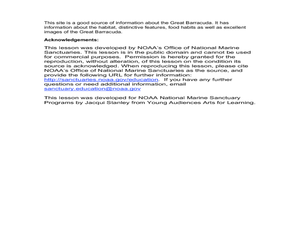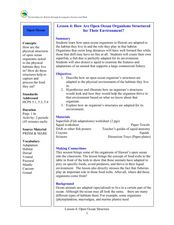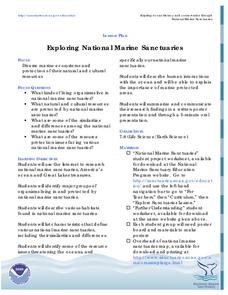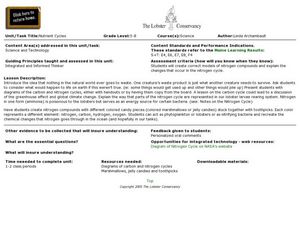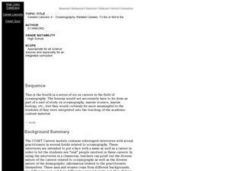Curated OER
The Great Barracuda
Students explore oceanography by researching the great barracuda. In this animal life lesson, students read several vocabulary terms dealing with ocean life and examine a drawing of a barracuda. Students examine the many...
Curated OER
Under Pressure: How Deep Can They Dive?
Students explore geography by conducting an in-class experiment. In this deep sea exploration lesson, students identify the different zones of the ocean and utilize water bottles, masking tape and scissors to conduct a water pressure...
Curated OER
The Intertidal Zone: Tide and How Creatures Survive
Students explore oceanography by completing science worksheets. In this tide pools lesson, students discuss the forces of the tide pools, the animals that live within them, and the impact they have on the rest of the ocean. Students...
Curated OER
How Are Open Ocean Organisms Structured for Their Environment?
Students explore biology by conducting an animal dissection. In this oceanography lesson, students identify the life cycle of a squid and other animals that are involved with commercial fishing. Students dissect a squid in class and...
Curated OER
Exploring National Marine Sanctuaries
Learners research marine ecosystems by creating class presentations. In this oceanography instructional activity, students research the different locations of marine sanctuaries by identifying them on a transparency map in class....
NOAA
Introduction to the Ocean Sciences
Engage your class with a mock National Ocean Sciences Bowl. The first installment of a 23-part NOAA Enrichment in Marine sciences and Oceanography (NEMO) program provides an introduction to the ocean sciences, as well as to the rules of...
NOAA
Plate Tectonics II
Mid-ocean ridges, rift valleys, island arcs, mountain ranges, earthquakes, volcanoes ... there are so many features associated with plate tectonics. The 14th installment of a 23-part NOAA Enrichment in Marine sciences and Oceanography...
NOAA
The Dead Zone
The fifth installment of a 23-part NOAA Enrichment in Marine sciences and Oceanography (NEMO) program defines dead zones and how they form. Pupils then examine data from the Gulf of Mexico to determine dead zone formation.
NOAA
Ocean Acidification
If tap water is more acidic than ocean water, why are we so concerned about ocean acidification? The third installment of a 23-part NOAA Enrichment in Marine sciences and Oceanography (NEMO) program focuses on carbon dioxide levels in...
NOAA
Technology I
Isn't technology great? The 12th installment of a 23-part NOAA Enrichment in Marine sciences and Oceanography (NEMO) program introduces technology that marine scientists use. Pupils take part in an activity using conductivity,...
NOAA
Ocean Layers I
How is it possible for ocean water to have layers? The sixth installment of a 23-part NOAA Enrichment in Marine sciences and Oceanography (NEMO) program investigates factors that cause different water densities to occur. Experiments...
NOAA
Currents
Learn how ocean currents are vital to humans and marine life. The eighth installment of a 23-part NOAA Enrichment in Marine sciences and Oceanography (NEMO) program, focuses on ocean currents and how they affect global climate. The...
NOAA
Wet Maps
How do oceanographers make maps under water? Junior explorers discover the technologies and processes involved in creating bathymetric maps in part three of a five-part series designed for fifth- and sixth-grade pupils. The lesson...
Curated OER
What Lives in the Open Ocean and Where Do They Live?
Students explore oceanography by participating in a flash card activity. In this ocean inhabitant lesson, students define a list of ocean related vocabulary terms and answer ocean geography study questions. Students utilize organism...
Curated OER
The Nutrient Cycles
Students investigate the circle of sea life by creating nitrogen compound models. In this oceanography lesson, students discuss sea creatures and where their waste goes. Students identify nitrogen cycles in the ocean by...
Curated OER
Journey of the Pacific Salmon
Students explore oceanography by researching migrating fish. In this Pacific Salmon lesson, students participate in a board game activity in which they move a salmon through their annual journey to the spawning habitat upstream. Students...
Curated OER
Fish Count
In this science worksheet, students read about how scientists determine the total number of fish in a population. Students also participate in a related math activity.
Curated OER
Conditions at Sea Data Activity
Students study how to forecast sea conditions. In this oceanography lesson students complete a class activity on wave making.
Curated OER
Oceanography-Related Careers: To Be or Not to Be. . .
High schoolers investigate various careers in the field of oceanography. They conduct Internet research, record data on a spreadsheet, write a justification to explain why someone should accept a position found online, and write a...
Curated OER
History and Oceanography
Students identify the accomplishments in oceanography from 17th-19th century, construct a time line with the scientists in chronological order, and discuss the parallels of oceanographic contributions with those in other areas of science...
Curated OER
Oceanography Class Quilt
Students create and observe a collage of oceanography topics that be placed on quilt tiles in a culmination art project to represent information learned.
Curated OER
Build a Model Submarine
Learners form lab groups and work together to construct a submarine out of a soda bottle. Next, they observe its action in a tub of water as the inner pressure is changed. It is an engaging experiment. However, links to outside resources...
NOAA
Vertebrates I
I spy a spine. The 19th installment of a 23-part NOAA Enrichment in Marine sciences and Oceanography (NEMO) program explores vertebrate species, such as sharks and other fish. Learners take part in an activity evaluating the...
NOAA
Invertebrates
Crabs and lobsters ... yum! The 18th installment of a 23-part NOAA Enrichment in Marine sciences and Oceanography (NEMO) program focuses on invertebrate marine life. After the lecture slideshow, learners conduct an activity to sample...
